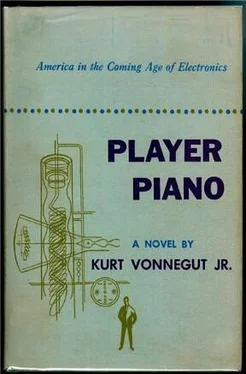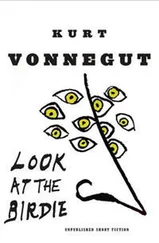Paul was half tight, and pleased with himself. Everything was going to be just fine.
"The Old Man wants to start the meeting shortly after his plane lands," said Kroner, "so we'll have to leave whatever's going on."
"O.K.," said Paul. "Swell." Swell night, tangy air, and a drowsy sort of harmlessness over everything. Maybe he'd give notice tonight, if he felt like it. No hurry. "Fine."
"Everybody in their seats, please," said the loudspeaker. "Will everybody take their seats. The Program Committee has just informed me that we are eight minutes behind time, so will everybody take their seats."
Everybody did. The band, wearing summer tuxedos, struck up a medley of Meadows favorites. The music faded. The quarter-spheres opened a trifle at the top, freeing a beam of light that shot through cigarette smoke to the deep-blue heavens. The music stopped, machinery underground grumbled, and the quarter-spheres sank into the earth, revealing:
An old man, with a white beard reaching to his waist, wearing a long white robe and golden sandals and a blue conical hat speckled with golden stars, sits atop an extraordinarily tall stepladder. He looks wise, just, and tired by responsibility. In one hand he holds a large dust cloth. Beside the ladder, and of the same height, is a slender pole. Another just like it stands across the stage. Between the two poles is a loop of wire, passing, like a clothesline, over pulleys fixed to the poles. Hanging from the wire are a series of metallic stars about two feet across. They are coated with fluorescent paint, so that a beam of invisible infrared light, playing on one star, then another, makes them come alive with dazzling color.
The old man, oblivious to the audience, contemplates the stars strung out before him, unhooks the star nearest to him, studies its surface, polishes a tarnished spot on it, shakes his head sadly, and lets the star fall. He looks down at the fallen star with regret, then at those still on the wire, then at the audience. He speaks.
OLD MAN. I am the Sky Manager. It is I who keep night skies shining brightly; I who, when a star's glory is tarnished beyond restoration, must take it from the firmament. Every hundred years I climb my ladder to keep the heavens bright. And now my time has come again.
(He pulls on the wire, bringing another star within reach. He removes the star and examines it.)
And this is a strange star to be shining in the modern heavens. And yet, a hundred years ago, when I last kept my vigil, it was proud and new, and only a few meteors, destroying themselves in a brilliant instant, shone more brightly than this. (He holds up the star, and the infrared light makes it glow brightly, bringing out the lettering which says, "Labor Unionism." He dusts it desultorily, shrugs, and lets it drop.) In brave company. (Looks down at scrap heap.) With stars named Rugged Individualism, Socialism, Free Enterprise, Communism, Fascism, and - (Leaves sentence unfinished, and sighs.)
It is not an easy job, not always a pleasant one. But One far wiser than I, infinitely good, has decreed that it must be done (sighs) , and be done dispassionately.
(He pulls on wire, and brings in another star, the biggest of all. The infrared light hits it, and it lights up brilliantly, and on it is the image of the Oak, the symbol of the organization.)
Alas, a young beauty. But already there are those who hate the sight of it, who clamor for it to be torn from the heavens. (He dabs at it with his dust cloth, shrugs, and holds the star at arm's length, preparatory to dropping it.)
Enter a clean-cut, handsome young engineer from audience.
YOUNG ENG. (Shakes foot of ladder.) No! No, Sky Manager, no!
OLD MAN . (Looks down curiously.) What is this? A mere stripling challenges the caretaker of the heavens? Enter unkempt young radical through trap door in stage.
RADICAL. (Sneeringly) Take it down.
YOUNG ENG. There's never been a more brilliant, beautiful star!
RADICAL. There's never been a bloodier, blacker one!
OLD MAN. (Looks perplexedly from the two men to the star and back.) Hmmmm. Are you prepared to appeal the fate of this star with reason rather than emotion? My duties require that I be the sworn enemy of emotion.
YOUNG ENG. I am!
RADICAL. I, too. (Smiles.) And I promise to take very little of your time.
CLOSE QUARTER-SPHERES.
OPEN QUARTER-SPHERES.
A tall judge's rostrum now surrounds the old man's ladder. The old man wears a judge's wig and robes. The radical and the young engineer are similarly robed and wigged after the fashion of English barristers.
OFFSTAGE
VOICE. Oyez, oyez, oyez! The Court of Celestial Relations is now in session!
OLD MAN. (Bangs with gavel.) Order in the court. The prosecution will proceed.
RADICAL. (Offensively ingratiating.) Your honor, ladies and gentlemen of the jury, the prosecution will show that the star in question is as tarnished - nay, black! - as any ever hung in the heavens. I will call but one witness, but that witness in effect is a million witnesses, each of whom could tell the same sordid tale, tell the unvarnished truth in the same simple words from the heart. I'd like to call John Averageman to the stand.
OFFSTAGE
VOICE. John Averageman, John Averageman. Take the stand, please. Enter John Averageman through trap door in stage floor.
(He is slightly pudgy, shy, middle-aged, endearing. His clothes are cheap, verging on being comical. He is in awe of the court, and has perhaps had a couple of drinks to bolster his nerve.)
RADICAL. (Touches John's arm.) I'm looking out for you, John. Take your time about answering. Don't let them rattle you. Let me do the thinking, and you'll be all right.
OFFSTAGE
VOICE. Do you solemnly swear to tell the truth, the whole truth, and nothing but the truth, so help you God?
JOHN. (Looks questioningly at radical.) Do I?
RADICAL. You do.
RADICAL. John, suppose you tell the court what you did before the war, before this new star arose to spoil, to besmirch the heavens.
JOHN. I was a machinist in the Averagetown Works of the Averagetown Manufacturing Company.
RADICAL. And now?
JOHN. I'm in the Reconstruction and Reclamation Corps, sir. Shovelman First Class.
RADICAL. Suppose, for the edification of the court, you tell us what you made before the star arose, and what you make now.
JOHN. (Stares upward, remembering and computing with difficulty.) Well, sir, when the defense work and all got going before the war, seems to me I could make better'n a hundred a week with overtime. Best week I ever had, I guess, was about a hundred and forty five dollars. Now I get thirty a week.
RADICAL. Uh-huh. In other words, as that star went up, your income dropped. To be exact, John, your income dropped about eighty per cent.
YOUNG ENG. (Jumps to feet impulsively, likably.) Your honor, I -
OLD MAN. Wait until the cross-examination.
YOUNG ENG. Yessir. Sorry, sir.
RADICAL. I think we've made it amply clear that the American standard of living has tumbled eighty per cent. (His features assume an annoyingly pious expression.) But enough of merely materialistic considerations. What has the ascent of this star meant to John Averageman in terms of his spirit? John, tell the court what you told me. Remember? About the engineers and managers -
Читать дальше








![Курт Воннегут - Вампитеры, фома и гранфаллоны [litres]](/books/397997/kurt-vonnegut-vampitery-foma-i-granfallony-litre-thumb.webp)